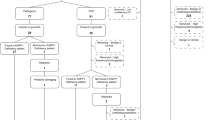Abstract
Background
Several metabolic disorders follow an autosomal recessive inheritance pattern. Epidemiological information on these disorders is usually limited in develo** countries. Our objective is to assess carrier frequencies of rare autosomal recessive metabolic diseases in a cohort of Brazilian patients that underwent molecular investigation with exome sequencing and estimate the overall frequency of these diseases using the Hardy–Weinberg equation.
Methods and results
We reviewed the molecular findings of 320 symptomatic patients who had carrier status for recessive diseases actively searched. A total of 205 rare variants were reported in 138 different genes associated with metabolic diseases from 156 patients, which represents that almost half (48.8%) of the patients were carriers of at least one heterozygous pathogenic/likely pathogenic (P/LP) variant for rare metabolic disorders. Most of these variants are harbored by genes associated with multisystemic involvement. We estimated the overall frequency for rare recessive metabolic diseases to be 10.96/10,000 people, while the frequency of metabolic diseases potentially identified by newborn screening was estimated to be 2.93/10,000.
Conclusions
This study shows the potential research utility of exome sequencing to determine carrier status for rare metabolic diseases, which may be a possible strategy to evaluate the clinical and social burden of these conditions at the population level and guide the optimization of health policies and newborn screening programs.

Similar content being viewed by others
Availability of data and material
All data are provided as “Supplementary Material”.
References
Morava E, Rahman S, Peters V, Baumgartner MR, Patterson M, Zschocke J (2015) Quo vadis: the re-definition of “inborn metabolic diseases.” J Inherit Metab Dis 38:1003–1006. https://doi.org/10.1007/s10545-015-9893-x
Saudubray JM, Garcia-Cazorla À (2018) Inborn errors of metabolism overview: pathophysiology, manifestations, evaluation, and management. Pediatr Clin N Am 65:179–208. https://doi.org/10.1016/j.pcl.2017.11.002
ACMG ACT Sheets and Algorithms [Internet]. Bethesda (MD): American College of Medical Genetics and Genomics; 2001-. Newborn Screening ACT Sheets and Algorithms. https://www.ncbi.nlm.nih.gov/books/NBK55827/
Ferreira CR, van Karnebeek CDM, Vockley J, Blau N (2019) A proposed nosology of inborn errors of metabolism. Genet Med 21:102–106. https://doi.org/10.1038/s41436-018-0022-8
Quaio CRDC, Moreira CM, Novo-Filho GM et al (2020) Diagnostic power and clinical impact of exome sequencing in a cohort of 500 patients with rare diseases. Am J Med Genet C Semin Med Genet 184:955–964. https://doi.org/10.1002/ajmg.c.31860
Richards S, Aziz N, Bale S et al (2015) Standards and guidelines for the interpretation of sequence variants: a joint consensus recommendation of the American College of Medical Genetics and Genomics and the Association for Molecular Pathology. Genet Med 17:405–424. https://doi.org/10.1038/gim.2015.30
Quaio CRDC, Chung CH, Perazzio SF et al (2021) Frequency of carriers for rare recessive Mendelian diseases in a Brazilian cohort of 320 patients. Am J Med Genet C Semin Med Genet 187:364–372. https://doi.org/10.1002/ajmg.c.31932
Edwards AW (2008) G. H. Hardy (1908) and Hardy-Weinberg equilibrium. Genetics 179:1143–1150. https://doi.org/10.1534/genetics.104.92940
Köhler S, Gargano M, Matentzoglu N et al (2021) The human phenotype ontology in 2021. Nucleic Acids Res 49:D1207–D1217. https://doi.org/10.1093/nar/gkaa1043
Lee JJY, Wasserman WW, Hoffmann GF, van Karnebeek CDM, Blau N (2018) Knowledge base and mini-expert platform for the diagnosis of inborn errors of metabolism. Genet Med 20:151–158. https://doi.org/10.1038/gim.2017.108
Applegarth DA, Toone JR, Lowry RB (2000) Incidence of inborn errors of metabolism in British Columbia, 1969–1996. Pediatrics 105:e10. https://doi.org/10.1542/peds.105.1.e10
Sanderson S, Green A, Preece MA, Burton H (2006) The incidence of inherited metabolic disorders in the West Midlands, UK. Arch Dis Child 91:896–899. https://doi.org/10.1136/adc.2005.091637
Zhang W, Yang Y, Peng W et al (2020) A 7-year report of spectrum of inborn errors of metabolism on full-term and premature infants in a Chinese Neonatal Intensive Care Unit. Front Genet 10:1302. https://doi.org/10.3389/fgene.2019.01302
Antonarakis SE (2019) Carrier screening for recessive disorders. Nat Rev Genet 20:549–561. https://doi.org/10.1038/s41576-019-0134-2
Keyfi F, Nasseri M, Nayerabadi S, Alaei A, Mokhtariye A, Varasteh A (2018) Frequency of inborn errors of metabolism in a Northeastern Iranian sample with high consanguinity rates. Hum Hered 83:71–78. https://doi.org/10.1159/000488876
Funding
The authors declare that no funds, grants, or other support were received during the preparation of this manuscript.
Author information
Authors and Affiliations
Contributions
All authors provided the conception and design of the study, acquisition of data, analysis and interpretation of data, drafting the article, revised it critically for important intellectual content and final approval of the version to be submitted.
Corresponding author
Ethics declarations
Conflict of interest
The following authors are employees (received salary and other bonuses) of Fleury Medicina e Saude: CRDCQ, CHC, SFP, APD, CMM. Author CAK declares no financial interests.
Ethical approval
This study was performed in line with the principles of the Declaration of Helsinki. This study was granted ethics committee approval from Fleury Group and Faculdade de Medicina da Universidade de São Paulo (Plataforma Brasil; CAAE# 02617018.3.0000.5474; Fleury# 3.372.339).
Informed consent
Informed consent was obtained from all individual participants included in the study. All authors are aware, consented and approved this publication.
Additional information
Publisher's Note
Springer Nature remains neutral with regard to jurisdictional claims in published maps and institutional affiliations.
Supplementary Information
Below is the link to the electronic supplementary material.
Rights and permissions
About this article
Cite this article
Quaio, C.R.D.A.C., Moreira, C.M., Chung, C.H. et al. Frequency of carriers for rare metabolic diseases in a Brazilian cohort of 320 patients. Mol Biol Rep 49, 3911–3918 (2022). https://doi.org/10.1007/s11033-022-07241-3
Received:
Accepted:
Published:
Issue Date:
DOI: https://doi.org/10.1007/s11033-022-07241-3




